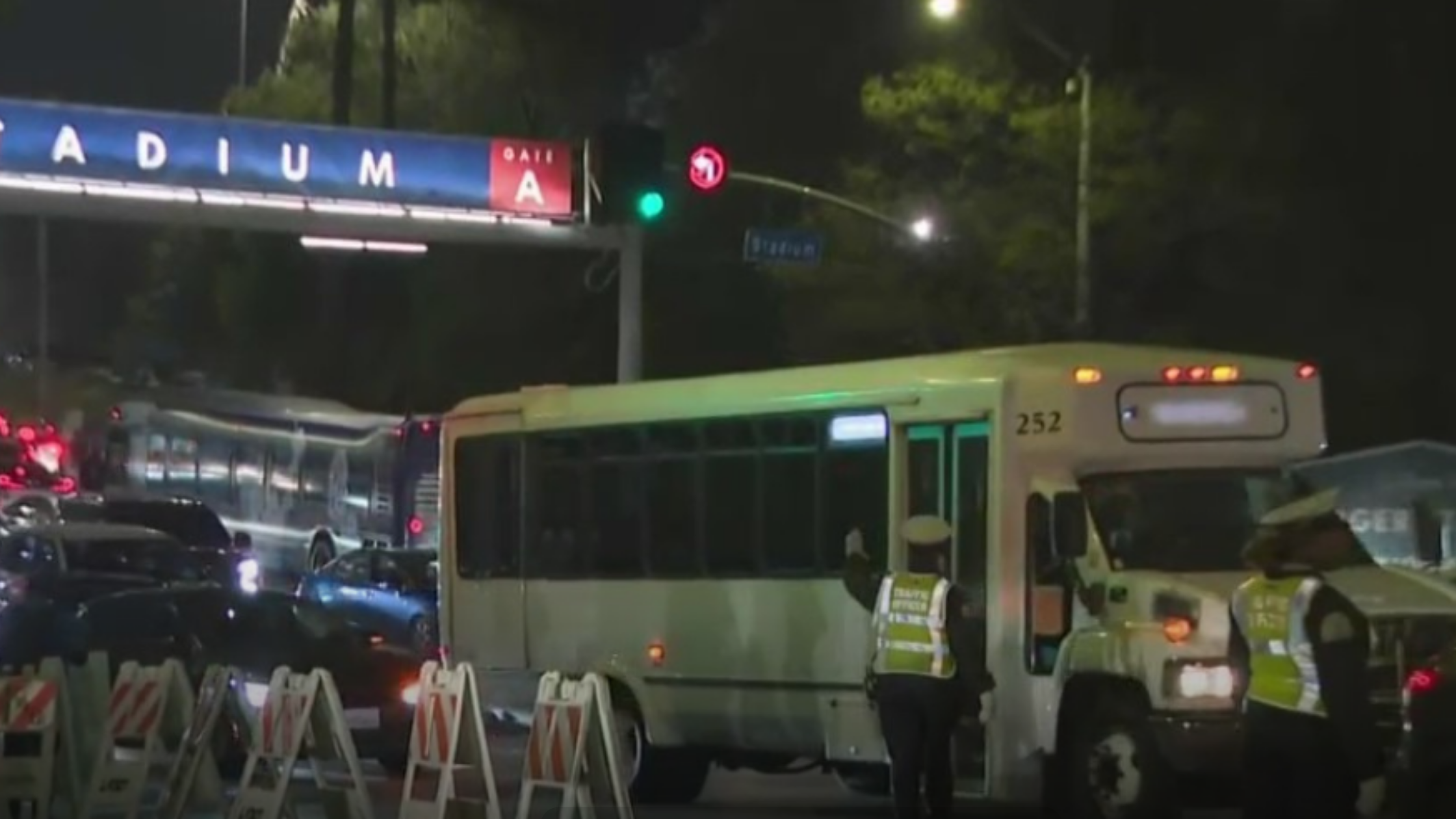Dodgers fans protest the presence of immigration agents outside Dodger Stadium, igniting a public outcry and prompting responses from the team, government officials, and community leaders. On June 19, 2025, tensions flared as federal agents in unmarked vans appeared near the stadium, stirring protests over the ongoing immigration raids in Los Angeles.
1. What happened at Dodger Stadium?
On Thursday morning, June 19, a fleet of unmarked SUVs and vans—initially believed to belong to U.S. Immigration and Customs Enforcement (ICE)—attempted to access parking lots at or near Dodger Stadium via Gate E and the Sunset Gate off Vin Scully Avenue. Social media posts showed masked agents gathered near stadium fencing, leading to speculation that ICE planned enforcement operations during the day’s game.
Community members and Dodgers fans quickly gathered, carrying signs such as “ICE out of LA” and chanting solidarity slogans. LAPD later separated agents and demonstrators, and the federal convoy dispersed.
2. Dodgers’ response and official clarification
The Dodgers organization released a statement on X (formerly Twitter), confirming that ICE agents requested, but were denied entry to the stadium grounds. The team affirmed that the evening’s game would continue as planned.
ICE later denied involvement, while the Department of Homeland Security clarified that the vehicles belonged to Customs and Border Protection (CBP) and were there “very briefly” for non-enforcement reasons.
3. Wider context: LA immigration raids & community climate
This incident came amidst escalating immigration enforcement across Los Angeles since June 6, with federal raids at Home Depot, detention centers, and other public spaces. Over 44 individuals were arrested on that day alone, sparking protests, freeway blockades, and the federal deployment of 4,100 National Guard troops and 700 Marines.
Protesters argued that enforcement tactics were overly aggressive and militarized. City officials—including Mayor Karen Bass and Councilmember Eunisses Hernandez—condemned the operations. Bass labeled them as “terrorizing immigrant families,” and Hernandez collaborated with the Dodgers and the Mayor’s office to remove agents from private property.
4. Community voices and fan tensions
Dodger fan groups, including CHIRLA (Coalition for Humane Immigrant Rights), converged at the stadium during the incident. Jorge-Mario Cabrera from CHIRLA emphasized the emotional impact: “Dodger Stadium is a place where Angeleno families come and have fun”.
Some fans have called for a boycott until the team takes a stronger public stance on immigration. Recent actions included singer Nezza performing the National Anthem in Spanish against the team’s wishes, supported by players like Kiké Hernández, who voiced frustration at the growing suppression of immigrant rights.
5. What’s next: Dodgers’ community commitment delayed
The Dodgers planned to roll out programs assisting immigrant communities, but stated those plans are delayed “because of the events earlier today” apnews.com+2cbssports.com. Dodgers President Stan Kasten said they will proceed once details are firmed up.
Analysts expect these initiatives will include legal aid clinics, community outreach, and partnerships with non‑profits like CHIRLA. The move is seen as crucial to retaining the team’s significant Latino fanbase and addressing growing political scrutiny.
The protest outside Dodger Stadium highlights how immigration policy now intersects with sports culture and community identity. With federal enforcement pushing into public spaces, the Dodgers’ response—initially defensive but now moving toward action—may become a pivotal moment in Los Angeles’ tense atmosphere.
For loyal fans and supporters of immigrant rights, this episode demonstrates that civic action and public scrutiny can prompt corporate institutions to rethink their role. The Dodgers’ next steps will determine whether they truly stand with their community or remain silent in the face of controversy.
1. The standoff at the stadium gates
On June 19, masked federal agents in SUVs and cargo vans attempted to enter Dodger Stadium’s parking lot near Gate E and the Sunset Gate off Vin Scully Ave. Video and witness reports captured hundreds of fans rushing to the gates, holding signs like “ICE out of LA,” creating an immediate flashpoint between law enforcement and civic protesters.
Los Angeles Police Department officers quickly intervened, positioning between agents and fans, before federal vehicles quietly retreated. Fans remained vocal, demanding accountability and transparency. This incident sparked broader community awareness of how immigration tactics are permeating local public spaces.
2. Dodgers deny ICE entry, clarify federal agency involved
Hours into the standoff, the Dodgers confirmed via X that they refused entry to ICE agents. Though the team initially remained quiet amid fan pressure, the statement confirmed: “ICE agents came… and were denied,” asserting the decision would not affect game day operations.
However, ICE countered that its personnel were not present, while DHS clarified the vehicles were CBP, briefly stationed for logistical reasons unrelated to any raid. Officials emphasized that the situation wasn’t tied to any stadium enforcement efforts, highlighting a difference between appearance and operational reality.
3. Emboldened protests across Los Angeles
Since June 6, federal raids in LA have arrested over 44 individuals, prompting community backlash, including freeway shutdowns, blocked roads, bankruptcies from labor disruptions, and the deployment of over 4,000 National Guard troops and Marines.
Public officials have criticized the aggressive federal immigration response. Mayor Karen Bass has called the raids terroristic to immigrant communities, while Councilmember Eunisses Hernandez has worked with private entities, including the Dodgers, to ban immigration agents from private properties.
4. Fan activism and cultural flashpoints
The stadium has become a stage for cultural protest. Singer Nezza’s Spanish rendition of the anthem, defying the team’s preference, went viral as a symbol of solidarity for immigrant fans. Kike Hernández amplified that message, calling the raids unjust and threatening community well-being.
Supporters of the protest at Dodger Stadium have organized boycotts, while the team faces pressure to balance corporate goodwill with fan identity. Protest actions in Los Angeles football and soccer arenas suggest this crossover of sports and activism is becoming mainstream.
5. The road ahead: Dodgers’ commitment and public trust
Dodgers leadership plans to unveil programs in support of immigrant families—delayed but not abandoned. These are expected to include legal assistance, resource centers, and partnerships with nonprofits. The success of these measures hinges on execution and community trust.
For fans, this episode may define the Dodgers as either a civic ally or a silent corporate entity. Their next steps will not only influence local support but may set a precedent for how sports franchises navigate politically sensitive community issues.
Closing & Call to Action
The intersection of immigration enforcement, fan activism, and civic accountability around Dodger Stadium highlights a shifting cultural landscape in Los Angeles. As the Dodgers prepare to unveil relief initiatives, their alignment-or lack thereof—with immigrant communities will define the roots of trust they hold in their fan base.
“Subscribe to trusted news sites like USnewsSphere.com for continuous updates.”





